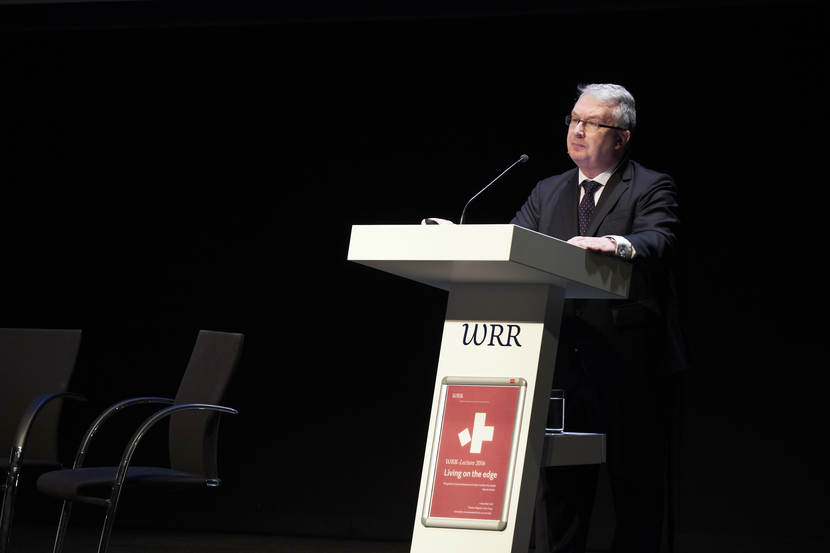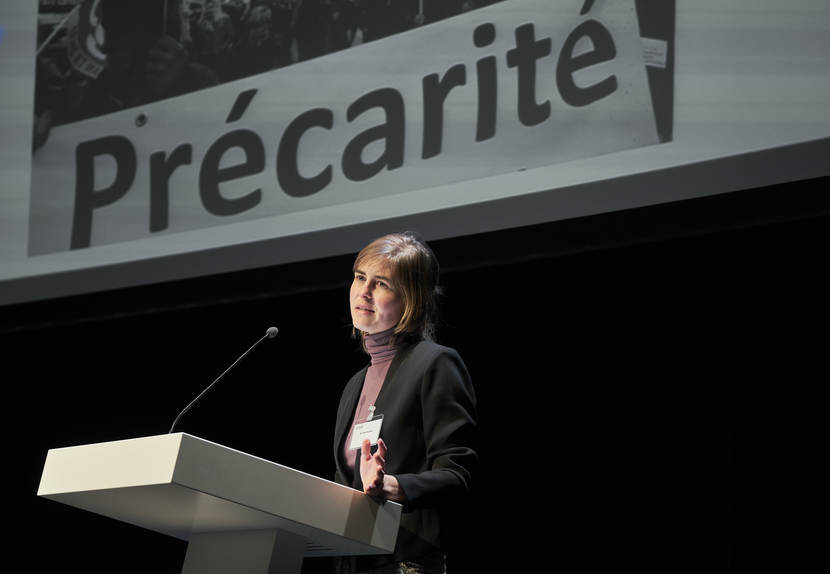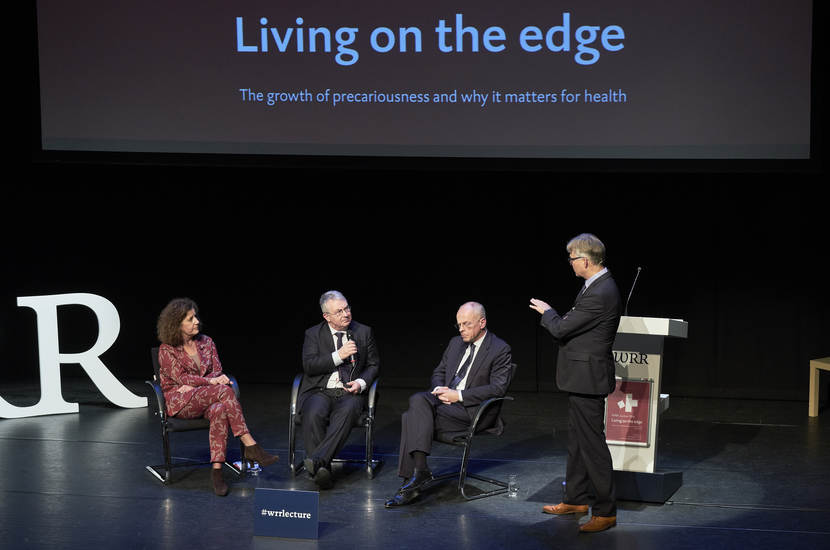Lecture 2016 'Living on the edge'
Wat is de invloed van ongelijkheid en toenemende onzekerheden op volksgezondheid in Europa? Deze vraag stond centraal tijdens de WRR-Lecture 2016 Living on the edge: the growth of precariousness and why it matters for health, gehouden op donderdag 1 december jongstleden in Den Haag. Burgers moeten erop kunnen vertrouwen dat samenleving en overheid zich om hen bekommeren en zorg bieden als die nodig is, bepleitte gastspreker professor Martin McKee.
Kwetsbaar
Steeds meer burgers in de westerse wereld voelen zich onzeker en zijn kwetsbaar ten aanzien van werk, inkomen, behuizing en voedselvoorziening. Deze ontwikkeling verdient meer aandacht in het beleidsdebat, aldus McKee. In zijn lezing ging de professor in op de aard en omvang van dit vraagstuk. Ook liet de volksgezondheidsonderzoeker zien dat deze ontwikkeling meer omvat dan traditionele sociale hiërarchieën zoals onderwijs en sociale klasse. Aan de hand van internationaal vergelijkende gegevens bracht hij een scala van problemen en gezondheidsbedreigingen in kaart. Hij gaf een analyse van de oorzaken van deze trend richting 'precariousness', en de uitdagingen waarvoor politiek, overheid en samenleving gesteld worden.
Reflectie
Filosoof Beatrijs Haverkamp (Wageningen UR) verzorgde een korte reflectie op de betekenis van het begrip gezondheid.
Paneldiscussie
Paneldiscussie onder leiding van WRR-lid Godfried Engbersen over de analyse van professor McKee en de implicaties daarvan voor nationaal en lokaal beleid. Vlnr: Ingrid van Engelshoven (wethouder gemeente Den Haag en eerste locoburgemeester), Martin McKee en Jan Anthonie Bruijn (hoogleraar immunopathologie en Eerste Kamerlid).
Video samenvatting WRR-Lecture 2016
Deze video is een samenvatting van de WRR-Lecture 2016 waarin prof. Martin Mckee sprak over de invloed van ongelijkheid en toenemende onzekerheden op volksgezondheid in Europa.
(On-screen title: WRR Lecture 2016. Living on the Edge. On-screen text: The growth of precariousness and why it matters for health. André Knottnerus:)
SILENCE
ANDRÉ KNOTTNERUS: Welcome to you all.
For the Scientific Council for Government Policy, the WRR,
in providing scientific advice over all policy domains,
one question is always central: How to serve the welfare and well-being of all people.
In local communities, nationally and in international contexts.
For the next 45 minutes, the floor goes to Martin McKee.
And please turn off all other noises.
(He laughs. Martin McKee:)
LAUGHTER
MARTIN MCKEE: So, let me just set the clock running.
I want to begin by thanking the Scientific Council for Government Policy
for asking me to give this very prestigious lecture.
And it's a particular pleasure
to see so many colleagues that I've worked with over the years in the audience today.
One of the greatest achievements of post-war Western Europe
was to provide security for its people.
We had collective security from external threats, in the form of NATO.
But we also had security from internal threats.
These internal threats were, oops...
(He clicks a remote control.)
Yeah. These internal threats were summarised in the United Kingdom
by William Beveridge as 'the five giant evils' of society: Want, Disease,
Ignorance, Squalor, and Idleness, and it was the struggle against these giants,
that was the basis of the post-war welfare state.
But memories fade.
The 1980s were a time of change, at least in the English-speaking world.
Ronald Reagan became President of the United States.
Margaret Thatcher became the British Prime Minister,
and together, they gave their names to a new philosophy,
characterised by shrinkage of the size of the state,
with privatisation of state-owned enterprises
and retrenchment of the welfare state.
Here in the Netherlands, Ruud Lubbers was pursuing similar policies.
It was much later that things really did change.
And the year was 2008, and the cause was a sequence of events far away.
The bottom line to all of this
was that governments gave a very large amount of our money to save the banks,
what we now call 'welfare for Wall Street',
leaving none for the ordinary people.
Many of those ordinary people had been coping up until then. But only just.
The situation got much worse when their employers started laying people off.
But in many countries, those who had enjoyed some degree of job security lost it.
Now, most of those who lost jobs did ultimately find new ones.
But when they did, the new ones were often very different.
There was no more certainty that, when you went to work on a Monday morning,
you would be paid to work until a Friday evening.
The term 'zero hours contract' entered the vocabulary in some countries.
What we're now seeing is a new class of workers.
A group of workers who do not have that control
and whose lives are dominated by what we might call 'precariousness'.
Now, concerns about precariousness
have become really quite widespread in the United Kingdom.
So, what I now want to do is look a little bit at those in the population
who are the precariat, or who, at least, have become so.
Well, we can see that precariousness is a complex, multifaceted concept
from some of the ways in which it has been described,
but what all of these have in common is that those whose lives are precarious
face uncertainty in several areas, including employment, income and housing.
It's been linked to what has been described as the 'privatisation of risk'.
Now, politicians often see this as a good thing.
They frame it as giving individuals back control.
And of course it has intuitive appeal, but it can equally be interpreted
as telling people that they are on their own.
And a widely mocked example in the UK is David Cameron's Big Society initiative.
Those whose lives are precarious may be rendered 'vulnerable'.
It is important to note, however, that precariousness
can cut across traditional classifications of social position or class.
Many of us here, Johan Mackenbach is in the audience,
and others have done tremendous work
in terms of looking at social class, the social inequalities in health,
but here we're seeing something new.
Individuals can be in a state of precariousness
even if they are well-educated and in employment,
like the example of university lecturers I mentioned earlier.
And of course, those people in conventional social epidemiology
would be considered as being in a favourable situation.
But the problem is that the people at the bottom of the pile,
they are particularly vulnerable, because they have no assets to fall back on.
Now, one contemporary example which I'm particularly familiar with,
in my role as medical director of the London School of Hygiene,
is that of junior doctors in the British National Health Service.
Now, we can look at this by thinking about how job loss is associated
with worse mental health and, in some cases, suicide.
Well, we were able to look at this.
We looked at the introduction of the minimum wage in 1999
as a natural experiment.
And what we found was that there was a significant improvement in mental health,
but only for those whose incomes increased by a few pennies.
It was a very small increase, but what we found was that the impact,
the magnitude of the change that they experienced, was considerable,
and it equated to what you would've found if you had put them on antidepressants.
So it suggests that, for people whose lives are precarious,
a very small change can make a very big difference.
But there is also 'précarité de travail', or precariousness of work.
And we've been looking at the epidemic of workplace suicides in France,
where increasing numbers of employees have chosen to kill themselves
in the face of the extreme pressures they're facing at work.
We can look beyond employment and income.
Many other people feel precarious because they may have nowhere to live.
Well, we took advantage of a natural experiment in the UK
to look a little bit closer at housing.
HE CLEARS HIS THROAT
And this was from 2011, April 2011,
when the government reduced its financial support
for low-income persons who were renting in the private sector.
And the impact was really quite substantial.
Those who were receiving housing benefit were losing about 1,500 euros a year.
And we compared mental health problems among those receiving housing benefit,
who would suffer a loss,
and those who did not receive benefit, who would be unaffected.
Now, of course, given that this was in the midst of the economic crisis,
it was unsurprising that even those who were spared the cuts
experienced some worsening in mental health.
But the change was several times larger among those whose benefits were cut.
Now, the final area where I want to look at precariousness
is the ability to feed oneself and one's family, which we might call,
we keep with the French, 'précarité de la sécurité alimentaire'.
We have seen a remarkable increase
in the number of foodbanks in the United Kingdom.
And we... So, I´ll come back to that in a minute.
But we were interested in what was happening across Europe,
and we used data from 21 countries
and we found that food insecurity had increased between 2004 and 2012,
and we could show when we looked at the natural experiments across Europe
that this was clearly associated with both job loss and with income reduction.
Let me just pull all of this together so far.
We have shown that the financial crisis and the subsequent imposition of austerity
has impacted on people in many ways.
An estimated five million European citizens lost their jobs between 2008 and 2010.
Many others have experienced reductions in income.
Many people have lost their homes, and if they haven't lost their homes,
they've fallen into arrears.
Although the data are not easily available, where we do have data, we can find
that the numbers of homeless increased by about 15 percent between 2008 and 2010.
Other people, shockingly, have gone without food.
In all of these ways, people's lives have become more precarious.
And as we have shown, this meant
not only that they were at greater risk of misfortune,
but if they are so unfortunate that a disaster strikes,
then the consequences are much worse than they were before.
And of course, what we have described is only the tip of the iceberg.
Many of those who have escaped these experiences
live in constant fear of the future.
Their jobs, their income, their housing may be secure for now,
but for how much longer?
They can still afford their homes. Will that continue?
And if they have to move to get a new job,
what will this mean for getting to work? Will they have to travel longer,
can they afford public transport? If you travel by train in the UK,
you do not have an 'OV-chipkaart' where the fare is the same all the time.
I envy you every time. I have my one, and it's a great asset
compared to what we have to put up with,
where you may need to book your train weeks in advance
to know that you'll get there at an affordable cost.
And what will a move mean for their children's schooling?
So we, in our research, have only just scratched the surface of this problem.
We have shown that even a very small change,
such as a wage increase that most of us would not even notice,
can make a big difference to mental health.
And in contrast, we have shown that a cut in housing benefit
can increase substantially the risk of mental illness.
And we have also seen the indifference of politicians
to the plight of those who are living on the edge.
Clearly, there is an enormous research agenda for the future.
Now, I hope that I have convinced you
that we should be concerned about precariousness.
I hope that I have shown how it impacts on the health
of some of the most vulnerable people in our societies.
But in the final part of my talk, I want to conclude by arguing
that there is another reason why we, as a society,
should be concerned about the growth and persistence
of a section of the population who feel left behind,
in a world that, for them, is characterised by uncertainty.
So, what we did was to go through the archives
and collect very detailed data, and we looked at voting patterns
in the five Reichstag elections between 1928 and 1933.
And we looked at a variety of measures of the economy.
In fact, the very poor, the people whose lives were hit hardest by job losses,
were not turning to the Nazis, they were turning to the communists.
It was those who were just above them in the pecking order who turned to the Nazis.
These were the group that had something to lose
and whose lives really were precarious.
If you're right at the bottom, you may not be precarious,
because you can't get any worse.
So let me conclude.
As someone who is concerned with the health of the population,
and especially the health of the most disadvantaged,
I must try to understand the impact on health
of the changes that are taking place in society.
And as a European researcher, and I should stress,
that despite the suicidal policies, or lack of policies
being pursued by the government of the country in which I currently live,
I am a committed European,
I have the benefit of an incredible natural laboratory to study these issues.
The growth of precariousness is not inevitable.
While wages have stagnated in the UK and Germany,
they have risen in Finland and Slovakia.
But the common feature of policies that protect the health of populations
in the face of adversity, active labour market programs
and policies to protect people from losing their homes,
is that they show ordinary people that those in power actually care.
They actually care about them, and that's a very important message.
But there is another reason why we should be concerned, and that's my final point.
Our democratic systems are based on a social contract.
And those in power, those with the power,
should not use that power to breach that contract.
Because if they do, we know the lessons of history,
and we know that if they do, it can have consequences for us all.
'Dank u wel.' Thank you very much.
APPLAUSE
(The screen turns dark red. On-screen text: WRR, The Netherlands Scientific Council for Government Policy. www.wrr.nl. Production: www.cimon.nl.)


